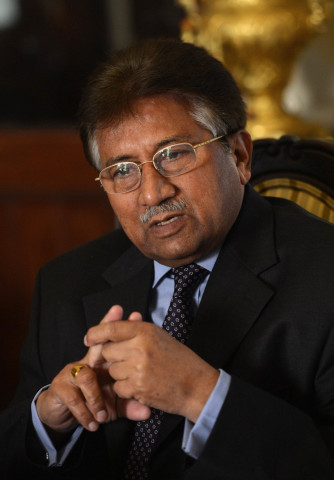Proceedings against Musharraf: IHC restrains special court till Feb 3
Ruling comes as co-accused challenge the Nov 21 order

The Islamabad High Court (IHC) on Tuesday restrained a special court from hearing the high treason case against former president Gen (retd) Pervez Musharraf after its November 21 order was challenged by the co-accused.
The short decree was announced by Justice Athar Minallah in response to petitions of former prime minister Shaukat Aziz, former chief justice Abdul Hameed Dogar and former law minister Zahid Hamid, who had challenged the November 21 order to include their names in the treason trial as abettors.
On November 21, special court had accepted Musharraf’s plea and ordered federal government for the inclusion of the names of co-accused in the list of abettors. The special court was to take up this case in the first week of January 2015.
The co-accused while challenging the order in their respective petitions argued that under Section 342 of the Criminal Procedure Code (CPC), the accused has no right to ask for a joint trial with the co-accused as it is only the right of the prosecution to decide who to prosecute. Under the Criminal Law Amendment (Special Court) Act 1976, [a] joint trial is not mandatory and it is on discretion of the government, not the trial court, they added.
On Tuesday, when Justice Minallah resumed hearing as an ‘objection case’, the counsel for former premier Shaukat Aziz asked the court which forum is to be used by his client to challenge the decision. He said first Aziz had challenged the decision in the Supreme Court but registrar did not accept it, then he filed a petition in the Islamabad High Court (IHC) where registrar again raised objection. He argued that special court has no mandate to include his client in the list of abettors as the judges of special court went beyond their limit.
Advocate Iftikhar Gilani, representing Abdul Hameed Dogar, maintained his client was unheard by the special court. He suggested the court to hear both the maintainability and fact of the case together. The counsel contended that his client was held responsible by the special court without hearing his point of view.
Advocate Harris Khalique, representing former law minister Zahid Hamid, argued that the application filed by Musharraf was based on assumptions as there was no concrete evidence on record that concluded any other person had collaborated, aided or abetted Musharraf in imposing the state of emergency in 2007. He requested the court to suspend the November 21 order.
Justice Minallah observed that the court has to see to two legal things: first whether the petitions are maintainable or not, and second, if they are maintainable, it will then be determined if the special court has power for the inclusion of co-accused in the list of abettors.
Musharraf’s legal representative Farogh Nasim informed the court that he has no issue if the court issues restraining orders.
After hearing arguments from all parties, Justice Minallah with the consent of all counsels issued a restraining order till February 3, 2015. After the said date, the hearing of the case will take place on a daily basis and the petitioner will start their argument over the maintainability of the petitions.
Published in The Express Tribune, December 24th, 2014.



















COMMENTS
Comments are moderated and generally will be posted if they are on-topic and not abusive.
For more information, please see our Comments FAQ